B2b Lead Generation Services for Healthcare, Supply Chain Tech and Fintech. Get customized digital marketing and inside sales solution help B2B businesses increase website traffic. Visit: -https://www.kredis.in/
Don't wanna be here? Send us removal request.
Text
The Power of Intent Marketing: Unlocking Customer Engagement
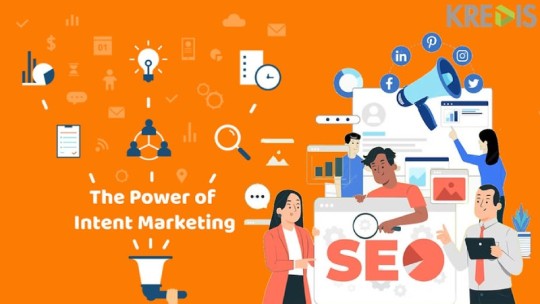
In today's digital age, marketing has evolved significantly. Businesses have transitioned from traditional advertising methods to more targeted and data-driven approaches. One of the most influential strategies that has emerged is intent marketing. Intent marketing is a powerful tool that allows businesses to engage with potential customers at precisely the right moment in their purchasing journey.
In this blog, we'll explore the concept of intent marketing, its significance, and how it can transform your marketing efforts.
Understanding Intent Marketing:
Intent marketing, in essence, revolves around identifying and targeting potential customers based on their intent to make a purchase. This concept is rooted in the idea that customers exhibit various signals or behaviors online that indicate their readiness to buy. These signals can be as explicit as performing a Google search for "best running shoes" or as subtle as browsing through product reviews and comparison articles.
Here's how intent marketing works:
1. Data Collection:
Marketers gather data from various sources, including website analytics, search behavior, social media engagement, and past purchase history. This data helps build a profile of the user's interests and preferences.
2. Analyzing Intent Signals:
By analyzing the collected data, marketers can identify patterns and signals that suggest a user's intent. For example, frequent visits to a particular product page or a sudden increase in search queries related to a specific product category.
3. Targeted Messaging:
Once a user's intent is understood, marketers can deliver highly targeted messages or offers that align with the user's current interests or needs.
The Significance of Intent Marketing:
Intent marketing offers several key advantages that make it a game-changer in the marketing landscape.
1. Higher Conversion Rates:
One of the most significant benefits of intent marketing is its ability to increase conversion rates. When you engage with potential customers at the moment they express interest, you're more likely to convert them into buyers.
2. Improved Customer Experience:
Intent marketing is not just about making sales but also about providing value to the customer. When you deliver relevant content or offers, you enhance the customer experience, which can lead to long-term customer loyalty.
3. Cost Efficiency:
Traditional marketing methods often involve reaching a broad audience, which can be costly and inefficient. Intent marketing, on the other hand, allows you to focus your resources on users who are more likely to convert, thus saving on advertising costs.
4. Personalization:
Intent marketing thrives on personalization. By tailoring your messages and offers to match a user's intent, you create a more personalized and engaging experience, which resonates with the user on a deeper level.
Implementing Intent Marketing:
To harness the power of intent marketing effectively, consider the following steps:
1. Data Collection:
Start by gathering data on user behavior and interactions on your website and other digital touchpoints. Tools like Google Analytics, CRM systems, and marketing automation platforms can be invaluable in this process.
2. Segmentation:
Use the collected data to segment your audience based on their intent. This could include categorizing users into stages of the buying journey or identifying specific products or services they are interested in.
3. Content Creation:
Develop high-quality, relevant content that speaks directly to the intent of each segment. This could be in the form of blog posts, product recommendations, email campaigns, or social media content.
4. Personalization:
Implement personalization strategies to tailor your messages and offers for each segment. Use dynamic content and recommendation engines to deliver the right message at the right time.
5. Continuous Optimization:
Monitor and analyze the performance of your intent marketing campaigns. Adjust your strategy as needed to improve results continually.
Real-World Examples:
Several well-known companies have successfully leveraged intent marketing to drive their business growth. Here are a few examples:
1. Amazon:
Amazon is a master of intent marketing. They use data on user behavior and previous purchases to recommend products that align with a user's interests, resulting in increased sales and customer satisfaction.
2. Netflix:
Netflix's recommendation algorithm analyzes user viewing history and preferences to suggest new shows and movies, keeping users engaged and subscribed.
3. Google Ads:
Google Ads allows advertisers to bid on keywords, ensuring their ads are displayed when users search for specific terms. This real-time intent marketing approach ensures that ads are shown to users actively seeking relevant information.
Challenges and Ethical Considerations:
While intent marketing offers substantial benefits, it's not without its challenges and ethical considerations. Users are increasingly concerned about privacy and data security, so it's crucial to be transparent and respectful in your data collection and usage. Ensure compliance with data protection regulations and provide options for users to control their data.
Additionally, intent marketing can sometimes be perceived as intrusive if not executed carefully. Bombarding users with too many messages or offers can have the opposite effect, driving them away rather than converting them into customers. Striking the right balance is essential.
In Conclusion:
Intent marketing is a powerful strategy that can transform your marketing efforts, leading to higher conversion rates, improved customer experiences, and cost efficiency. By collecting and analyzing data, segmenting your audience, creating relevant content, and personalizing your messaging, you can engage with potential customers at the right moment in their buying journey.
However, it's crucial to approach intent marketing with transparency, ethics, and a focus on providing value to your customers. When done right, intent marketing can be a win-win for both your business and your audience, unlocking the full potential of digital marketing in the 21st century.
Read This Full Article At:- B2B Intent Marketing
0 notes
Text
The Role of AI in Revolutionizing B2B Inside Sales and Digital Marketing
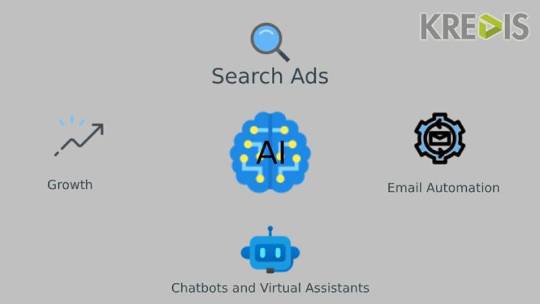
In today's fast-paced and technologically driven business landscape, companies are constantly seeking new ways to improve their sales and marketing efforts. The rise of Artificial Intelligence (AI) has brought about a significant transformation in how organizations approach B2B inside sales and B2B digital marketing.
AI is proving to be a game-changer, providing businesses with the tools and insights they need to reach their target audience more effectively and efficiently. In this blog, we will explore the various ways in which AI is revolutionizing inside sales and digital marketing.
Understanding the Basics: What is AI?
Artificial Intelligence, or AI, refers to the simulation of human intelligence in machines programmed to think, reason, and problem-solve. It encompasses a wide range of technologies, including machine learning, natural language processing, and computer vision, all of which contribute to its ability to analyze and interpret vast amounts of data.
AI systems learn from data and experience, continually improving their performance and decision-making. This capacity for learning and adaptation is what makes AI a valuable asset in inside sales and digital marketing.
AI in B2B Inside Sales:
Inside sales, the process of selling products or services remotely rather than through traditional field sales, has seen a significant transformation thanks to AI. Here are some of the ways in which AI is revolutionizing this aspect of business:
1. Lead Scoring and Qualification:
AI helps sales teams identify the most promising leads by analyzing data from various sources. This data-driven approach ensures that sales representatives focus their efforts on leads that are more likely to convert into customers. By automating lead qualification, AI saves time and resources.
2. Predictive Analytics:
AI can predict which products or services will most likely appeal to specific customers based on their past behaviors and preferences. This information enables sales teams to offer personalized recommendations, increasing the chances of making a sale.
3. Sales Forecasting:
AI can analyze historical sales data, market trends, and various other factors to provide accurate sales forecasts. This information allows businesses to make informed decisions regarding inventory, staffing, and overall sales strategy.
4. Chatbots and Virtual Assistants:
AI-driven chatbots and virtual assistants can engage with website visitors, answer common questions, and even assist with the purchase process. This improves customer satisfaction and captures leads even outside regular business hours.
5. Dynamic Pricing:
AI algorithms can adjust product prices in real time based on demand, competition, and other factors. This dynamic pricing strategy can optimize revenue and maximize profit margins.
AI in B2B Digital Marketing:
Digital marketing has become the cornerstone of many businesses' marketing strategies. AI is playing a pivotal role in enhancing the effectiveness and efficiency of digital marketing efforts in the following ways:
1. Personalized Content:
AI analyzes user behavior and preferences to deliver highly personalized content to website visitors and email subscribers. This level of personalization significantly enhances the user experience and increases the likelihood of conversions.
2. Search Engine Optimization (SEO):
AI tools can help identify relevant keywords, optimize website content and track search engine ranking. This not only increases organic traffic but also helps businesses stay competitive in the digital space.
3. Chatbots for Customer Support:
In addition to aiding inside sales, chatbots can also provide immediate support and assistance to website visitors, enhancing customer satisfaction and retention.
4. Social Media Advertising:
AI helps target the right audience on social media platforms by analyzing user behavior and demographics. It can also automate the management of ad campaigns, making it easier for businesses to reach their target audience effectively.
5. Content Creation and Curation:
AI can generate content, such as reports, articles, and even social media posts, saving businesses time and resources. While human creativity is irreplaceable, AI can assist in content creation and curation, ensuring a consistent online presence.
Read This Full Article At :- B2B Lead Generation Services
0 notes
Text
1 note
·
View note
Text
Inside Sales and Intent Marketing: A Perfect Synergy for Conversions
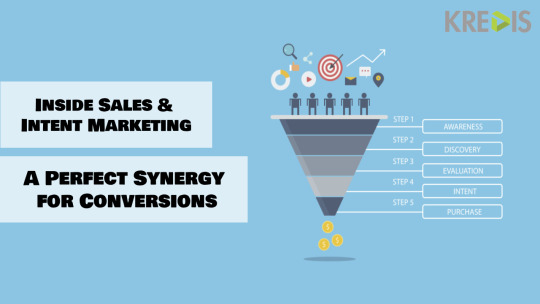
In today's highly competitive business landscape, effective sales strategies are essential to drive revenue and growth. Two powerful techniques, inside sales and intent marketing, have gained significant traction in recent years. While each approach has its merits, their true potential is unlocked when they work in synergy.
In this blog post, we'll explore how inside sales and intent marketing complement each other to create a winning formula for driving conversions.
Understanding Inside Sales and Intent Marketing
Before delving into their synergy, let's briefly define inside sales and intent marketing:
Inside Sales:
Inside sales is a method of selling that relies on remote communication, such as phone calls, emails, or video conferencing, to engage with prospects and convert them into customers. It allows sales teams to connect with potential buyers without the need for face-to-face interactions.
Intent Marketing:
Intent marketing is a data-driven strategy that involves monitoring and analyzing online behaviors and signals to understand the intent of potential customers. This data can include search queries, website visits, social media interactions, and more. Intent marketing helps identify prospects who are actively looking for solutions or products.
The Perfect Synergy
Now, let's explore how inside sales and intent marketing can work together to supercharge your sales efforts:
1. Prioritizing High-Intent Leads:
Intent marketing helps identify leads that are actively researching and showing interest in your product or service. Inside sales teams can use this data to prioritize high-intent leads, ensuring they receive immediate attention. This targeted approach increases the chances of conversion.
2. Personalized Outreach:
Armed with intent data, inside sales reps can craft highly personalized and relevant messaging. By understanding the prospect's needs and the context of their search, sales reps can engage in more meaningful conversations, which often result in higher conversion rates.
3. Timely Follow-ups:
Intent marketing provides real-time insights into when prospects are actively searching for solutions. Inside sales teams can use this information to time their follow-up calls or emails when the prospect's interest is at its peak, increasing the chances of engagement and conversion.
4. Content Alignment:
Intent data reveals the type of content or information prospects are seeking. Inside sales can align their conversations and content with these needs. This approach not only resonates with prospects but also demonstrates a deep understanding of their pain points.
5. Lead Scoring:
With the help of intent data, inside sales teams can develop lead-scoring models. These models assign scores to leads based on their demonstrated interest, allowing sales reps to focus their efforts on the leads with the highest intent and conversion potential.
Read This Full Article At:- B2B Lead generation
0 notes
Text
Unleash Conversion Excellence: Explore the Dynamic Fusion of Inside Sales and Intent Marketing in Our Latest Blog. Elevate Your Strategy, Transform Leads into Loyal Customers, and Achieve Unprecedented Business Success.
0 notes
Text
Unlocking Success: Targeting the Right B2B Audience with Digital Marketing
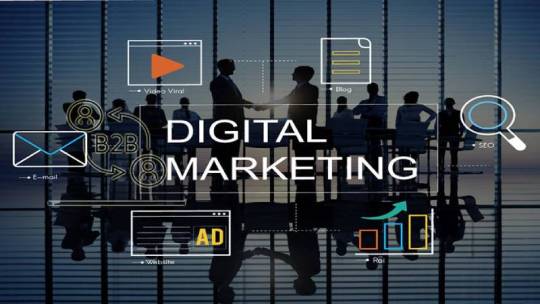
In today's digital age, the success of any B2B company hinges on its ability to reach and engage the right audience effectively. Gone are the days of cold calls and mass emails; digital marketing has emerged as a powerful tool for B2B companies to pinpoint their target audience with precision. In this blog, we will explore how B2B companies can leverage digital marketing strategies to reach and engage the right set of audiences, ultimately driving growth and success.
Understanding Your Audience:
Before delving into digital marketing strategies, it's crucial to have a deep understanding of your target audience. In the B2B space, this involves identifying not only the companies you want to reach but also the specific individuals within those organizations who hold decision-making power.
1. Buyer Personas:
Develop detailed buyer personas that encompass the demographics, job roles, pain points, and goals of your ideal customers. Understanding their challenges and aspirations will help tailor your digital marketing efforts to address their specific needs.
2. Market Segmentation:
Divide your target market into segments based on industry, company size, and other relevant factors. This segmentation will enable you to create highly targeted campaigns that resonate with each segment.
Crafting a Compelling Content Strategy:
Digital marketing is not just about pushing your products or services; it's about providing value to your audience. Content is the cornerstone of any successful digital marketing strategy.
1. Educational Content:
Create informative blog posts, whitepapers, ebooks, and webinars that address the pain points of your target audience. Position your company as an industry thought leader by sharing valuable insights and solutions.
2. Case Studies:
Showcase your success stories through case studies that highlight how your products or services have helped other businesses overcome challenges. This builds trust and credibility with potential customers.
3. Video Marketing:
Videos are a powerful medium for explaining complex B2B offerings. Create explainer videos, product demos, and customer testimonials to engage your audience visually.
Leveraging Social Media:
Social media platforms are a goldmine for B2B companies to connect with their audience and build relationships.
1. LinkedIn:
As the go-to platform for professionals, LinkedIn offers a fertile ground for B2B companies. Regularly share industry insights, engage with relevant groups, and showcase your expertise through thought leadership posts.
2. Twitter:
Use Twitter to share real-time updates, and industry news, and engage in conversations with your target audience. Hashtags can help expand your reach to a broader audience.
3. Facebook and Instagram:
While these platforms are often associated with B2C marketing, they can be valuable for B2B companies too. Share visually appealing content, behind-the-scenes glimpses, and success stories to humanize your brand.
Paid Advertising Campaigns:
Paid advertising campaigns can quickly get your message in front of the right eye.
1. Google Ads:
Use Google Ads to target keywords related to your industry and offerings. Ensure your ad copy speaks directly to the pain points and needs of your audience.
2. LinkedIn Ads:
Run targeted LinkedIn ad campaigns based on job titles, company size, and industry. LinkedIn's robust targeting options make it an ideal platform for B2B advertising.
3. Display Advertising:
Display ads on industry-specific websites and publications to reach an audience already interested in your niche.
4. Retargeting:
Implement retargeting campaigns to re-engage website visitors who didn't convert initially. This can significantly improve conversion rates.
SEO Optimization - B2B Digital Marketing:
Search engine optimization (SEO) is an ongoing process that ensures your content ranks high in search engine results. When done correctly, it can drive organic traffic from your target audience.
1. Keyword Research:
Identify the keywords and phrases your audience is searching for. Create high-quality content around these keywords to attract organic traffic.
2. On-Page SEO:
Optimize your website's structure, meta tags, and content for search engines. Make sure your site is mobile-friendly for users on various devices.
3. Link Building:
Build high-quality backlinks from reputable websites in your industry. This not only improves your search rankings but also establishes your authority in the field.
Also Read: Why Digital Marketing is Important for B2B Businesses
Analytics and Data-Driven Decisions:
Digital marketing is not a one-size-fits-all approach. To continually improve your efforts, you need to analyze data and make data-driven decisions.
1. Website Analytics:
Use tools like Google Analytics to track user behavior on your website. Identify which content is resonating with your audience and which isn't.
2. Email Analytics:
Monitor email open rates, click-through rates, and conversion rates. A/B testing can help optimize email campaigns.
3. Social Media Insights:
Analyze engagement metrics such as likes, shares, comments, and click-through rates to gauge the performance of your social media content.
4. Advertising Metrics:
Track the ROI of your paid advertising campaigns. Adjust your budget and targeting based on which campaigns deliver the best results.
Continuous Improvement:
The digital landscape is constantly evolving, and your audience's preferences and behaviors change over time. Therefore, it's essential to continuously adapt and refine your digital marketing strategies to ensure you're always targeting the right audience effectively.
1. Stay Informed:
Keep up with industry trends and emerging technologies. What worked yesterday may not work tomorrow.
2. Competitor Analysis:
Analyze what your competitors are doing in the digital space. Are there any gaps or opportunities you can capitalize on?
In conclusion, targeting the right set of audiences in B2B digital marketing is not a one-time task but an ongoing process that requires a deep understanding of your audience, the creation of valuable content, and the use of various digital channels.
By crafting a well-rounded digital marketing strategy that includes content creation, social media engagement, paid advertising, SEO optimization, data analysis, and continuous improvement, B2B companies can effectively reach and engage their ideal customers, ultimately driving growth and success in the digital age.
Source Of this Article:- b2b digital marketing
0 notes
Text
0 notes
Text
Outsourced Inside Sales - A Bliss for Startups
Startups exist in a highly competitive world, where every single advantage you can have makes the difference between survival and failure. Outsourcing critical operations might sound risky, but it opens up a way to take the pressure off your shoulders and utilize the ability of specialized professionals.
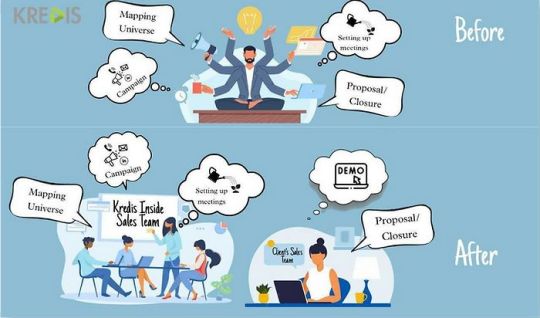
What are Outsourced Inside Sales?
The company's outsourced Inside sales team will work on your behalf, find leads, qualify, hold sales meetings, and acquire new business for you. Outsourcing inside sales reduces responsibility and allows internal teams to devote more time and effort to their core business skills.
In-house inside sales provide direct control, while outsourcing provides access to business expertise, resulting in increased productivity and increased return on investment. And as the outsourced inside sales model continues to demonstrate guaranteed value and returns, many companies are either adopting outsourcing or all of their inside sales operations in-house.
Benefits of Outsourcing Inside Sales:
Inside sales may seem to be one of your business's most essential and intimate parts, but handing over control to an outsourced partner can lead to sure profits.
You can achieve many things by outsourcing all or part of your internal sales process :
1. Significantly cost-effective than an In-house inside sales team:
This is where outsourcing internal sales can reduce costly investments. Outsourcing your inside sales team can significantly reduce your overall recruiting and training costs. This is possible because external vendors have hired, carefully selected, and trained an entire team of inside sales professionals. As a result, you have instant access to the right people. That way, you won't miss out on qualified leads opportunities that might slip past just by internally managing your sales team. Since you run a business that employs sales professionals for life, outsourcing inside sales ensures that you are essentially turnover-free. If someone leaves your sales team, outsourcing eliminates the need to start the hiring process over. An in-house inside sales infrastructure and technology platform has been established to reduce costs further.
2. Arms you with Latest software and technologies:
In 2021, there is more and more talk of inside sales management service providers armed with the latest software. Outsourcing firms save money by purchasing subscriptions in bulk (for large groups) or by sharing a single account among multiple contacts. This bulk utilization and digital orientation aren't possible for many startups that lack the funding and know-how to digitize. The direct benefits of this are twofold, firstly in terms of cost reduction, and secondly in utilizing and accessing the best technological solutions to internal sales processes.
3. Allows you to target new markets:
In sales, all leads are essential, but not all are significant assets to your business. If you are in startup mode or busy with new companies, you need to take the time to connect with potential clients who could have a significant impact on your business in the short term and develop long-term prospects. When you outsource some of their initial connection and appointment settings, you can be sure to meet people who are already qualified and responsible for inside sales. This is an excellent use of your sales time, and you can focus your energies on finding suppliers and talking to potential customers who will grow your business.
4. Insights-driven revenue uplift:
Salespeople can present a complete set of quality metrics as well as long-term satisfactory customer performance insights. These indicators should include the value of performance and process innovation. Real-time data can be used to show compliance with quotas, close rates, activity details, and other metrics and be further leveraged for exploration, upselling, and discussion of new strategies. Additionally, the report should focus on the metrics identified and overview the desired progress and outcomes for quarterly allocations.
5. Develops innovative outbound strategies:
The idea of outbound communication makes many business people worried. Cold calls can often be very awkward for most people to focus on. Outbound calls still have a place in the inside sales ecosystem, however, and working with outsourced teams can shift the burden of this exhaustion from core sales and marketing teams. Outsourced distributors can not only go through random task lists but can also work with customers to develop custom triggers and generate outbound inside sales calls. It also helps you formulate strategies to minimize buyer issues by making calls based on specific potential benefits rather than one-off calls.'
Companies in the startup ecosystem often operate on tight budgets. The idea of "you get what you eat" forces you to choose between limiting these businesses and investing money to aggressively hunt leads or work with staff on a finance crunch.
Inside Sales Outsourcing helps technologies and startups scale faster and begin to populate their business systems. This allows investors to get excited about the startup without investing too much in hiring and retaining inside salespeople.
Kredis is a leading outsourcing inside sales company, Helping businesses grow with their lead generation skills. We have catered to more than 100 companies, and they tasted success. You can taste success, too. Reach out to us
Read This Full Article At :- Digital Marketing
1 note
·
View note
Text
Why Digital Marketing is Important for B2B Businesses
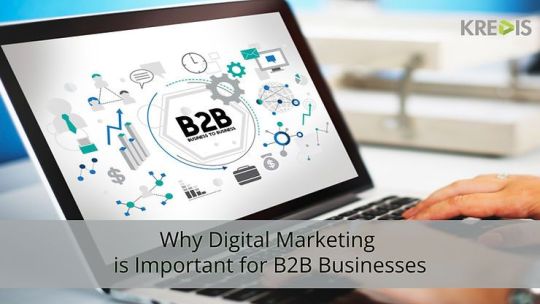
In today's fast-paced, interconnected world, the landscape of business-to-business (B2B) marketing has evolved dramatically. Gone are the days when B2B companies relied solely on traditional marketing channels like trade shows and cold calling to generate leads and secure clients. Instead, a digital transformation has taken place, and digital marketing has become an indispensable tool for B2B businesses. In this blog, we'll explore why digital marketing is so important for B2B businesses and how it can help them thrive in the modern marketplace.
1. Wider Reach and Targeted Audience:

One of the most significant advantages of digital marketing for B2B businesses is the ability to reach a vast and highly targeted audience. Through various online channels such as search engines, social media, email marketing, and content marketing, B2B companies can expand their reach far beyond their local or regional boundaries. This increased reach allows businesses to connect with potential clients across the globe, opening up new growth opportunities.
Moreover, digital marketing enables precise targeting. B2B companies can define their ideal customer profiles and create highly targeted campaigns that resonate with specific industries, job roles, company sizes, and more. This level of granularity ensures that marketing efforts are focused on the most relevant prospects, increasing the chances of conversion.
2. Cost-Effective Marketing:
Compared to traditional marketing methods like print advertising or trade shows, digital marketing offers a cost-effective approach to reaching and engaging with potential customers. Digital advertising, for instance, allows businesses to set precise budgets and track their return on investment (ROI) in real time. This means that B2B companies can allocate their marketing budgets more efficiently, ensuring that they get the most value for their money.
In addition, content marketing and organic search engine optimization (SEO) strategies can drive sustainable, long-term traffic to a company's website without ongoing high costs. This cost-effectiveness is especially critical for B2B companies that may be working with limited marketing budgets.
3. Measurable Results:
Digital marketing provides B2B businesses with the ability to track and measure the performance of their marketing campaigns with unparalleled precision. Analytics tools and data-driven insights allow companies to see which strategies are working and which need adjustment. This data-driven approach empowers businesses to make informed decisions about where to allocate their resources for the best results.
Metrics such as website traffic, conversion rates, email open rates, click-through rates, and social media engagement can all be tracked and analyzed to gauge the effectiveness of various marketing initiatives. This level of visibility into campaign performance enables constant optimization and refinement of marketing strategies, ensuring that resources are focused on the most profitable avenues.
4. Building Brand Authority and Trust:
In the B2B world, trust and credibility are paramount. Digital marketing can help B2B businesses establish themselves as industry leaders and build trust with their target audience. Content marketing, in particular, allows companies to create valuable, informative content that showcases their expertise and industry knowledge.
By consistently producing high-quality content, B2B businesses can position themselves as authorities in their niche. This not only helps in lead generation but also in nurturing relationships with potential clients. When businesses provide valuable insights and solutions to their audience's pain points, they become a trusted resource, making it more likely that prospects will choose them when it's time to make a purchase decision.
5. Adaptability and Agility:
The digital landscape is dynamic, with trends, technologies, and consumer behaviors constantly evolving. B2B businesses that embrace digital marketing are better equipped to adapt to these changes quickly. They can pivot their strategies in response to market shifts, emerging technologies, or competitive pressures.
Digital marketing channels also offer flexibility in terms of campaign timing and content adjustments. Unlike traditional advertising, which often requires long lead times and fixed commitments, digital marketing campaigns can be modified in real time. This agility allows B2B businesses to respond to opportunities and challenges swiftly.
6. Enhanced Lead Generation:
Generating high-quality leads is a primary objective for B2B businesses and digital marketing excels in this regard. Through tactics like content marketing, pay-per-click advertising, and lead-nurturing workflows, digital marketing can attract, capture, and nurture leads effectively.
For instance, content marketing can offer downloadable resources such as whitepapers, eBooks, or webinars in exchange for contact information, allowing businesses to identify and engage with potential customers. Email marketing automation can then nurture these leads, providing them with relevant information and building a relationship until they are ready to make a purchase decision.
Read This Full Article At :- b2b digital marketing
0 notes
Text
Top 5 Reasons Why to Outsource Inside Sales
0 notes
Text
0 notes
Text
Top 5 Reasons Why to Outsource Inside Sales

The most important defining characteristic of any business is its revenue. The revenue a business is able to generate determines its position in the market. Mostly, the revenue depends on the number of sales. This is the reason why business houses are ready to take any measures for increasing their sales.
Sales outsourcing is one such method by the way of which companies attract increased volumes of sales for their products or services. By opting for inside sales outsourcing, the company can easily grab more market share with fast and focused salesmen.
Below listed are the main reasons because of which nowadays many companies are opting for inside sales outsourcing instead of hiring sales force:
1. Wide coverage:
Outsourcing of sales allows the company to enjoy a wider market. Due to the efforts of experienced salesmen across the globe, the company can effortlessly increase its market share. The outsourcing company gets the advantage of increased revenue. With this option, you can let your existing sales team focus on their given segments and tasks, while you can easily capture more customers. The experts who take the outsourced work generate leads and allow you to step towards being a market leader.
2. Faster results:
By outsourcing your work to highly qualified and skilled professionals, you need not have to wait for getting incredible results. On the other hand, if you had decided to focus on getting the task done by your sales team, then you had to have them trained for the work. This would be the long route with no guarantee of results. So it’s better to be smart enough to get access to thoroughly vetted and trained inside sales professionals to get your work done.
3. No hassles of hiring:
When the sales are outsourced, it saves the company from getting into the hassle full work of recruiting and then training the employees. This helps the company have the best of both worlds! It saves the cost of hiring and also allows the company to get the work done by specialists. So, it’s not a good choice to focus your time and attention on work which can be easily managed outside your premises.
4. Expansion without headaches:
With the help of inside sales outsourcing, a company can expand the scale of operations without having to fret about hiring costs, operational needs or any other facilities which employees would require when they work in the offices. With outsourcing, you can get fast and timely results.
Read This Full Article At:- outsource b2b inside sales
0 notes
Text
Discover our B2B digital marketing services at Kredis. We are a B2B-focused digital marketing company that offers a range of services, including SEO, PPC, Linkedin Ads and Meta Ads Services. Explore how we can empower your B2B brand in the digital landscape.
0 notes